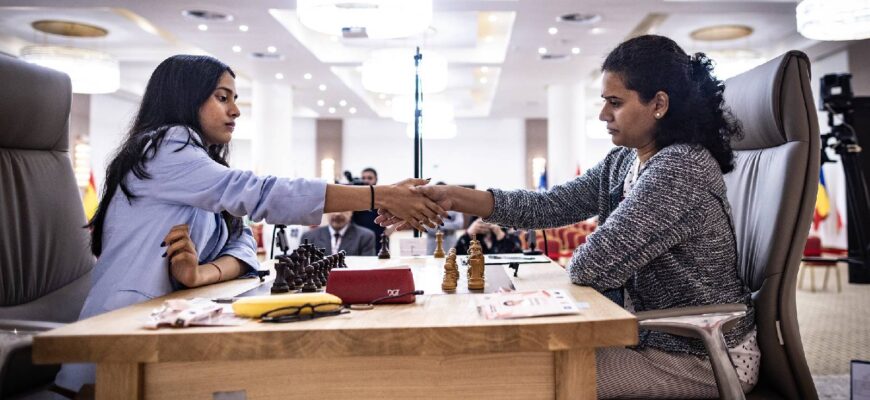Batumi, Georgia — The 2025 FIDE Women`s Chess World Cup final has delivered a dramatic standoff, as Indian chess titans Koneru Humpy and Divya Deshmukh concluded their second classical game with another draw. This outcome forces the championship into a series of tie-breaks, ensuring a nail-biting conclusion to what has been a truly captivating tournament.
The stage was set for a decisive second game, particularly after a tense Game 1 that also ended in a stalemate. For 19-year-old Divya Deshmukh, the first game was a source of frustration, as she later admitted to seeing winning lines but failing to capitalize. “Even though it was a draw, it kind of felt like a loss,” she confessed, highlighting the immense psychological toll of high-stakes chess where near-victories can sting more than outright defeats. This sentiment underscores the brutal mental landscape players navigate at the elite level, where every move, every decision, carries the weight of potential glory or regret.
Game 2: A Calculated Risk, A Hard-Fought Draw
Veteran Grandmaster Koneru Humpy, with her formidable experience and an impressive undefeated streak with white pieces in Batumi, entered Game 2 with a perceived advantage. Opting for a somewhat unexpected Reti opening that transitioned into an English Opening, Humpy aimed to exert pressure. Deshmukh, in response, deployed the sturdy Agincourt Defence, signaling her intent to meet aggression with resilient counter-play.
For much of the game, a draw appeared to be the natural trajectory. Yet, the tranquility was shattered around move 21, as both players engaged in deep thought, spending considerable time on their clocks. The real moment of self-imposed peril for Deshmukh arrived at move 24. A lengthy 19-minute deliberation saw the young prodigy stray from safer paths, a decision she candidly reflected upon after the game. “I think I got myself into a mess for no reason,” Divya revealed, a surprising admission from someone competing for a World Cup title. Her search for a win, she explained, led her to overlook a crucial move (Qb8) and grapple with a choice between g6 and g5, ultimately concluding that g5 would have been the superior, less problematic option. It’s a fascinating glimpse into the mind of a top player, where the pursuit of perfection can sometimes lead one down a rabbit hole of unnecessary complexity.
This willingness to take risks, even if deemed “needless” in hindsight, is a hallmark of Deshmukh`s playing style. “I’ve been doing it for years now, so I think it’s just embedded in me to push,” she stated. This philosophy, while often yielding brilliant victories, also carries the inherent danger of miscalculation. In Game 2, however, Divya`s remarkable accuracy in subsequent moves allowed her to navigate the tightrope she had created for herself, skillfully parrying Humpy’s attempts to exploit the situation. Each precise move closed off Humpy`s options, gradually steering the game back towards an undeniable equilibrium.
Ultimately, after 34 moves, the game concluded with a three-fold repetition, and the players mutually agreed to a draw. It was a testament to Deshmukh’s resilience and tactical precision under pressure, effectively denying Humpy the opportunity to secure a victory in the classical format.
The Psychological Chessboard: Awaits the Tie-Breaks
With two draws now under their belts, the focus irrevocably shifts to the tie-breaks. Koneru Humpy, as the reigning World Rapid champion, holds a significant advantage in the faster time controls that define tie-break scenarios. Her experience and proven prowess in quickfire chess make her a formidable favorite. Yet, to underestimate Divya Deshmukh would be a grave error. Throughout this tournament, the 19-year-old has systematically overcome higher-ranked opponents, demonstrating a remarkable ability to perform under immense pressure and upset expectations.
The tie-breaks represent not just a battle of technical skill, but a profound test of nerves, stamina, and mental agility. Each player will have to confront their own strengths and weaknesses, balancing aggressive play with careful calculation, all while the clock relentlessly ticks down. “I`m going to give my best. She`s of course a really strong player but I`m hoping things go my way,” Divya remarked, embodying the blend of respect for her opponent and fierce self-belief that defines championship contenders.
This “India vs. India” final has become a compelling narrative of generational talent meeting seasoned mastery. The chess world waits with bated breath to see which Grandmaster will ultimately hold their nerve better, and whose strategic vision will prevail in the unforgiving crucible of the tie-breaks. The stage is set for a truly memorable conclusion to the FIDE Women`s Chess World Cup.









